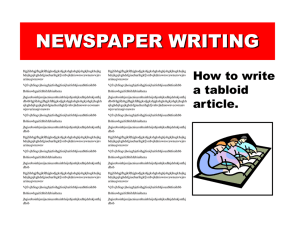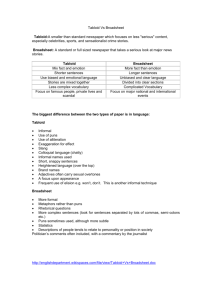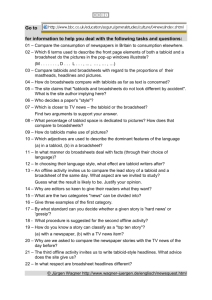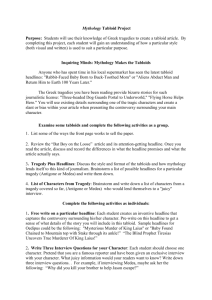Tabloid Culture. Trash Taste, Popular Power and the Transformation
advertisement
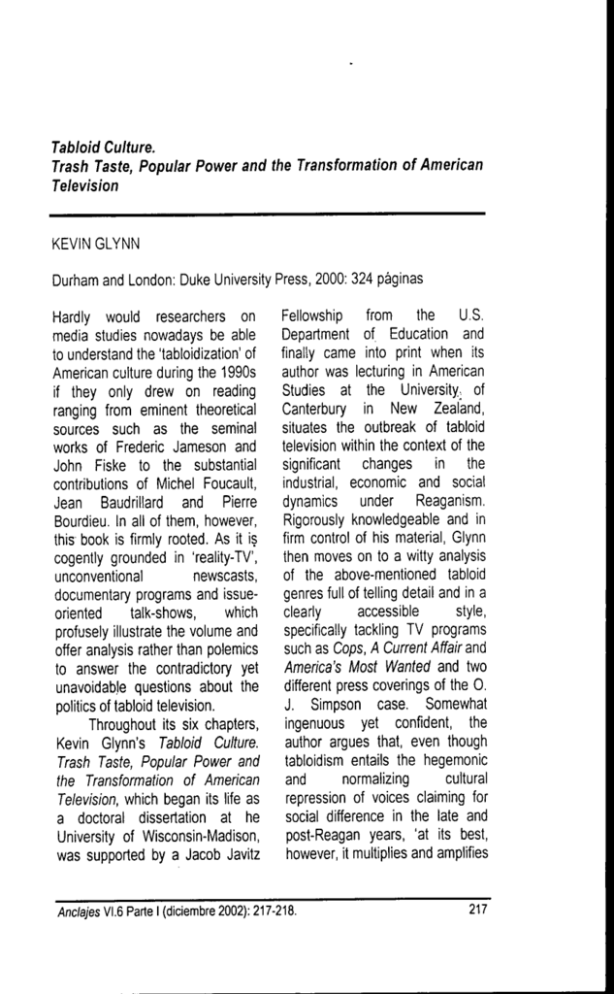
Tabloid Culture. Trash Taste, Popular Power and the Transformation of American Television KEVIN GLYNN Durham and London: Duke University Press, 2000: 324 paginas Hardly would researchers on media studies nowadays be abie to understand the 'tabloidization' of American culture during the 1990s if they oniy drew on reading ranging from eminent theoretical sources such as the seminal works of Frederic Jameson and John Fiske to the substantial contributions of Michei Foucault, Jean Baudrillard and Pierre Bourdieu. In all of them, however, this book is firmly rooted. As it is cogently grounded in 'reality-TV, unconventional newscasts, documentary programs and issueoriented talk-shows, which profusely illustrate the voiume and offer analysis rather than polemics to answer the contradictory yet unavoidable questions about the politics of tabloid television. Throughout its six chapters, Kevin Giynn's Tabloid Culture. Trash Taste, Popular Power and the Transformation of American Television, which began its life as a doctoral dissertation at he University of Wisconsin-Madison, was supported by a Jacob Javitz Feiiowship from the U.S. Department of Education and finally came into print when its author was lecturing in American Studies at the University, of Canterbury in New Zealand, situates the outbreak of tabloid television within the context of the significant changes in the industrial, economic and social dynamics under Reaganism. Rigorously knowledgeable and in firm control of his material, Glynn then moves on to a witty analysis of the above-mentioned tabloid genres full of telling detail and in a clearly accessible style, specifically tackling TV programs such as Cops, A Current Affair and America's Most Wanted and two different press coverings of the 0. J. Simpson case. Somewhat ingenuous yet confident, the author argues that, even though tabloidism entails the hegemonic and normalizing cultural repression of voices claiming for social difference in the late and post-Reagan years, 'at its best, however, it multiplies and amplifies Anclajes VI.6 Parte I (diciembre 2002): 217-218. 217 Enrique Aiejandro Basabe the heterogeneous voices and vievi^points in circulation in contemporary culture, giving reign to many that are typically excluded from the dominant regime of truth through the dynamics of race, class, gender, age and sexuality' (227), Tabloidism, as v^ell as the growing use of the Internet, Glynn positively believes-- seems to provide a new realm for open public discussion and debate in. which demonizing characterizations must be actually contested. Nevertheless, he probably falls short and fails to see the underground logic which governs this apparently democratic circulation of alternative knowledges and whose real power hides itself under the politically correct mask of repressive tolerance (Eduardo Gruner in El fin de las pequenas historias. De los estudios culturales al retomo (imposible) de lo tragico. Buenos Aires, Barcelona, Mexico: Paidos, 2002), even more repressive than tolerant after September H ^ 2001, Enrique Alejandro Basabe Universidad Nacionai de La Pampa 218 Anclajes Vi,6 Parte i (diciembre 2002): 217-218,


